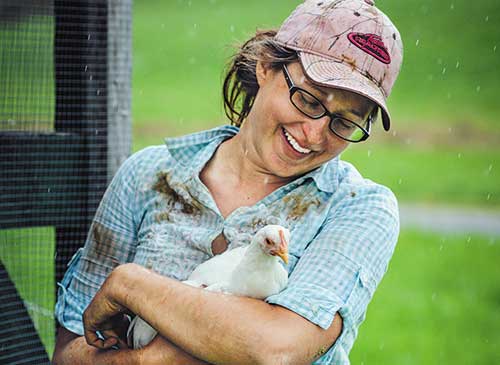Taking an inside look at how the food we eat gets to our table
Ask any farmer what's in a day's work, and he could list any number of roles: mechanic, nutritionist, ecologist and even doctor. Long hours are spent planning, planting and harvesting.
Ask many consumers where their food comes from, though, and they might be stumped. The grocery store? The farmers' market? Sure, we know our food is grown or raised somewhere, but what does it take to get that food from a farm to our dinner tables?
Our food - whether it comes from a grocery store, farm stand or even our own garden - requires an incredible amount of labor, stewardship and knowledge. In fact, more than 21 million American workers (15 percent of the total U.S. workforce, according the American Farm Bureau) play a role in producing, processing and selling the nation's food.
So how, exactly, do we get that food? At Brubaker Dairy Farm in Mt. Joy, Pa., it begins by growing a crop to feed 950 dairy cows. This third-generation family farm, managed by brothers Tony '94 and Mike Brubaker, produces 8,250 gallons of milk a day. To make sure the cows stay healthy, quality feed is important.
"We want to harvest our grains when they're at prime nutritional value for our cows," said Mike Brubaker. "Sometimes, that means we have only a one- or two-day window to get everything harvested."
Growing crops is just a small part of the labor required on a dairy farm. The cows must be milked three times a day. The milk from Brubaker Farm goes to a local co-op who finds buyers such as Turkey Hill Dairy and Chobani yogurt, among others.
"We tell people we really enjoy what we do, but we feel it is noble work too," said Tony Brubaker '94. "We're feeding the world."
Messiah students enrolled in the course Ecology and Sustainability take field trips to Everblossom Farm, a USDA-certified organic farm in East Berlin, Pa. Since Everblossom is driven primarily by community supported agriculture (CSA), in which members buy produce 'shares' assistant farm manager Lauren Sadler focuses on having enough to feed the 200 families who have signed up.
"We begin our crop plan in December, but it always evolves," said Sadler. "It's important to have it to fulfill orders, but, more than that, it helps us decide our crop rotation. We plant 30-40 varieties of vegetables, plus berries, herbs and flowers. By rotating our crops, we maintain the natural nutrients in the soil and keep the soil from eroding."
After planting, the farmers maintain the fields through nutrient testing, irrigation and weed control. Then, it's harvest time. Sadler says every minute a harvested vegetable isn't eaten by a customer, it loses nutritional value. Picking produce at its freshest point gives CSA members a tasty, healthy product.
So if we know that getting our food involves much more than a quick trip to the grocery store, how do we support those producing our food? Where is the farming industry headed? That's where we as consumers come in. Buying the food supports all of those involved.
In 1935, the number of U.S. farms peaked at 6.8 million, according to the Environmental Protection Agency. Today, the number has dropped to 2.2 million, with farmers making up only two percent of the nation's population. Just like any other business, farmers must stay innovative. At Everblossom, they've incorporated a build-your-own-box CSA share, giving buyers a more flexible option to choose the fresh produce they want. Brubaker Farm incorporates renewable energy with solar panels and a methane digester that converts bovine waste into electricity.
"You can't stay the same or you're going backwards, so you have to continually get better at what you do," said Mike Brubaker. "We not only have to continue producing higher quality food products, but we also continue to strive to be more environmentally conscious and stable, and more efficient."
With the growing movement to know where our food comes from, more people have an interest in farming and being effective stewards of the land. David Foster, Messiah professor of biology who leads the sustainability studies major, says he sees that care when he works with his students.
"People get into farming for different reasons," said Foster, "but one reason is because there's something deeply satisfying about the process. It's still miraculous to see that little seed sprout. When we are in communion with God through creation, we come to know him in the way Romans 1:20 talks about: That God's very power and majesty are known through the goodness of the creation. Through farming, we experience that in a personal way, and we crave that."
At Messiah, students care for a community garden, raise a flock of chickens and learn how to preserve food in a canning lab, among other efforts, gaining firsthand experience of communing with creation.
Local food is unofficially described as being grown within a 100-mile radius of where it's sold. In the production of food, 17 percent of the price reflects the cost of transportation and energy use. The concern of 'food miles,' pesticide use, where food is grown and by whom fuels the interest in buying local food, says Foster.
For example, unripe tomatoes are picked because they don't bruise as easily during transport. The downside, says registered dietitian Amanda Frankeny '09, is that picking produce early sacrifices many of the nutrients. Combine that factor with travel time and sitting on a grocery store shelf, and the produce has fewer nutrients than if you'd picked it out of your garden.
In addition to the health benefits, buying locally keeps money in your community, "Knowing your farmer and how they take care of their property and their facilities is really powerful," said Frankeny. "By developing a relationship with them, you begin to know their practices and get a true sense of where your food comes from."
The constant care of the farmer, the dedicated sellers and every person in between are part of a larger food system. So next time you pick up a gallon of milk or make a fresh salad from the greens you gather at the market, think of the time, effort and admirable work ethic of the people who brought that product to your table.
- Erin Bray '10

